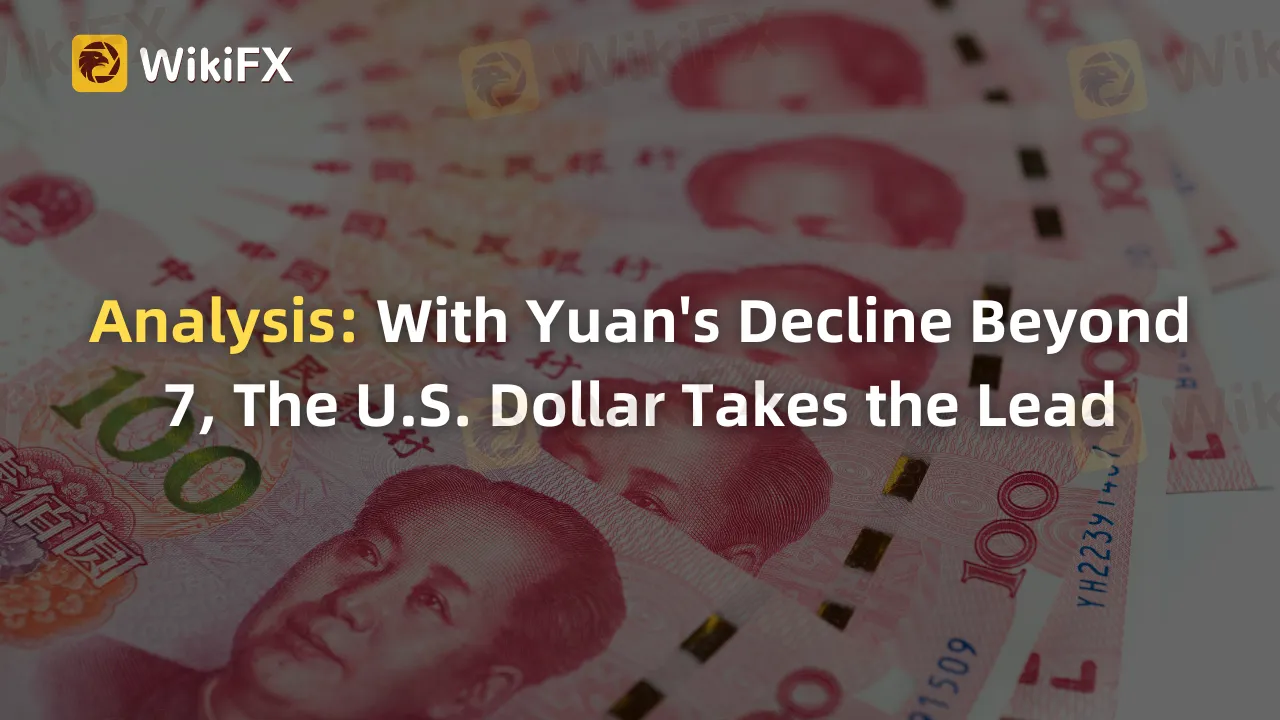Abstract:China's yuan has dropped to multi-month lows due to the U.S. Federal Reserve's policies, with further declines expected. This, along with a slow Chinese economic recovery, has led to capital fleeing China's markets. China's Central Bank has yet to intervene to protect the currency.

China's tightly regulated yuan has slumped to several-month lows, breaking past the crucial 7-per-dollar mark, with forecasters projecting further declines and pinning the blame squarely on the U.S. Federal Reserve's policy rather than economic softness within China.
Thursday saw the yuan, also known as the renminbi, tumble to 7.0234 per dollar, levels not witnessed since last December prior to the optimism surrounding China's post-COVID-19 resurgence which temporarily uplifted the currency.
Skepticism over the vigor of its economic rebound has resulted in foreign capital fleeing China's markets, leading to the currency depreciating by 4% against the dollar since late January.
Economists at Nomura and Societe Generale anticipate the yuan could soon descend to 7.3, a trough last seen in November. Societe Generale's Lead Asia Macro Strategist, Kiyong Seong, predicts that a growing divergence in monetary policy between China and the U.S., in conjunction with uninspiring Chinese growth, would weaken the yuan further.
“Much of the recent surge in the dollar-yuan exchange rate can be attributed to the dollar; this isn't purely a renminbi issue,” commented Alvin Tan, Head of Asia FX Strategy at RBC Capital Markets in Singapore.
In line with this view, the trade-weighted CFETS basket, which serves as the People's Bank of China (PBOC)'s benchmark for managing the currency, has dipped to 99 from 100 in February.
While the Federal Reserve contemplates halting its tightening cycle after raising rates by 5 percentage points since March 2022, China looks poised to maintain relaxed monetary conditions amidst indicators suggesting its recovery might be losing momentum.

A discrepancy in yields in the forwards market sees the yuan trading stronger, thereby discouraging exporters from converting their income. The six-month yuan is currently at 6.89.
An anonymous Shanghai-based exporter remarked that he was holding onto his dollars instead of exchanging them for yuan. “I shouldn't be too greedy, but the yuan will fall to 7.3. I'm going to wait,” he stated.
The PBOC hasn't indicated discomfort with the currency's recent trends or intervened to protect it. However, RBC's Tan suggests the authorities will aim to prevent excessive sell-offs.
“Even if the yuan weakens, they'd prefer it to be controlled. It has been fairly orderly up till now,” Tan noted.
The PBOC has not immediately commented on the situation.
Becky Liu, Head of China Macro Strategy at Standard Chartered Bank, predicts that the yuan will continue its downward trajectory.
“The interest rate gap is still substantial, leading many hedge funds to utilize the yuan as a funding currency,” stated Liu.
She added that besides the carry trade, imminent dividend payments also impact the yuan's value. In the short term, Liu expects the yuan to face pressure rather than appreciating significantly.
According to analysts at Nomura, mainland China firms listed in Hong Kong and disbursing dividends are projected to make roughly $8 billion in payments each in June and July 2023.
Typical yuan boosts from capital inflows are dwindling as exporters withhold flows and foreign investors postpone market entry until more robust economic momentum and regulatory support are evident.
While foreign net purchases of Chinese stocks amount to approximately 193 billion yuan ($27.92 billion) so far in 2023, bonds worth 226.5 billion yuan have been offloaded in the first four months of this year, per Reuters' calculations based on official data.
Commercial banks' forex operations show a net increase in dollar sales. According to the State Administration of Foreign Exchange, it sold $9.8 billion to its clients in the first four months of the year.
Nonetheless, according to PBOC statistics, foreign currency deposits increased by $28 billion this year, totaling $881.9 billion at the end of April.
With the Federal Reserve's policies directly hurting the yuan and China's internal economic issues, it seems that the yuan's rough trip is far from finished. Analysts and market players will continue to carefully examine these events in the coming months in order to better grasp the worldwide consequences of the continued currency devaluation.
Although China's recovery from the COVID-19 epidemic seemed promising at first, current monetary circumstances imply a more cautious approach is required. As the nation grapples with these complicated economic realities, it becomes clear that the pandemic's impacts continue to echo in unforeseen ways.
In conclusion, the yuan's trajectory is influenced by both local and foreign influences. While China's own economic development and regulatory measures are important, foreign factors, notably the Federal Reserve's actions in the United States, have a substantial impact. As the global financial landscape unfolds, the continued devaluation of the yuan is a momentous phenomenon with far-reaching ramifications for the global economy.
($1 = 6.9121 Chinese yuan renminbi)
Download and install the WikiFX App on your smartphone to stay updated on the latest news.
Download the App here: https://social1.onelink.me/QgET/px2b7i8n











